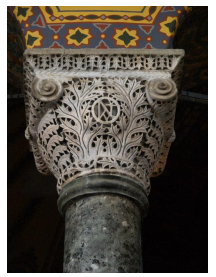EARLY CHRISTIAN & BYZANTINE
1/46
There's no tags or description
Looks like no tags are added yet.
Name | Mastery | Learn | Test | Matching | Spaced | Call with Kai |
|---|
No analytics yet
Send a link to your students to track their progress
47 Terms
Western (Rome) & Eastern (Byzantine)
Emperor Diocletian divided the Empire into two (2) divisions
HOLY ROMAN EMPIRE (WESTERN ROME)
Recognized Pope as person of authority beside the Emperor
BYZANTINE EMPIRE (EASTERN ROME)
Does not recognize the Pope as authority, start of Eastern Orthodox Christianity
Simplicity in Design and Treatment, Coarseness in Execution, Transitional Architecture (from Roman basilicas)
3 characteristics of Early Christian Architecture
Monumental structure, Intricate ornamentation, Symmetrical Central Plans
3 characteristics of Byzantine Architecture
Trabeated (Post and Lintel), Arcuated (Arches, Vaults, and Domes)
2 System of Construction of Early Christian Architecture
Pendentives and Central Domes, Roman Concrete and Brickwork
2 System of Construction of Byzantine Architecture
Arcade
a series of arches and columns supporting the walls
Roman concrete, bricks, mosaics
Byzantine Building Materials
Early Christian Architecture
RECTANGULAR & CIRCULAR PLA
Byzantine Architecture
GREEK CROSS PLAN
apse
semi-circular chapel at the end of the nave used for the throne of the bishop and the altar
Side aisle
walkway of a church running parallel
NARTHEX
the entrance hall or porch preceding the nave of a church
Ambulatory
a passageway around the apse church
Antepodium
A seat behind the choir reserved for clergy
Bema
a stage reserved for the clergy
Chevet
the apse, ambulatory, & radiating terminal of church
Clerestorey
an upper stage in the church w/do. above the adjacent roof priest with the flatform roof.
Clergy
priest with the religious elders
Dias
raised flatform reserved for the seatingf of speakers or dignitaries.
Oratory
samll private chapel furnished w/ an altar and crucifix
Rederos
an ornamental screen or wall at the back of the altar
Transept
portion of churching crossing the main axis at the right angle and forming cruciform plan
tribune
a slightly elevated flatform or Dias for the speaker.
triforium
roof over the aisles below the clerestorey
Sepulcher
a tomb or a receptacles
Basilicas
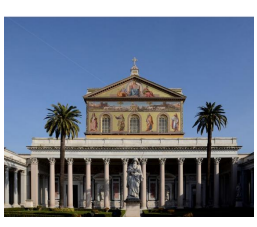
Baptistery
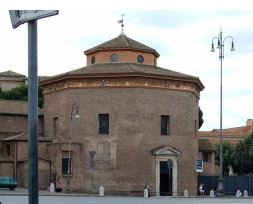
Tombs
decorative surfaces formed by small cubes of stone, glass, and marble.
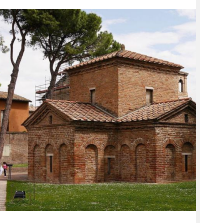
Mosaics
decorative surfaces formed by small cubes of stone, glass, and marble.
OLD ST. PETER’S BASILICA
Considered the prototype for Early Christian architecture adapted from Roman basilica layouts
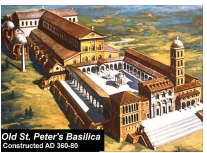
BASILICA OF SANTA SABINA
Originally a house of a Roman noblewoman
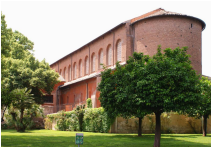
BASILICA OF SANTA PUDENZIANA
Recognized as the eldest historical place of worship in Rome
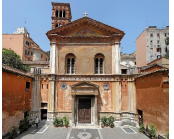
BASILICA PAPALE DI SAN PAOLO FUORI LE MURA
The basilica was founded by the Roman Emperor Constantine I over the burial place of Saint Paul
SANTA MARIA MAGGIORE
The largest Catholic Marian church in Rome, Italy.
SAN CLEMENTE AL LATERANO
the structure is a three-tiered complex of buildings
SANTA SABINA
the oldest Roman basilica in Rome that preserves its original colonnaded
BAPTISTERY
Used only for the sacrament of baptism, on festivals, of Easter, Pentecost and Epiphany
LATERAN BAPTISTERY
This baptistery was founded by Pope Sixtus III in 440
TOMBS
Usually domed and enriched with lavish mosaic decorations
TOMB OF GALLA PACIDIA, RAVENNA
Is a cruciform chapel or oratory that originally adjoined the narthex of the Church of the Holy Cross (Santa Croce) in Ravenna.
HAGIA SOPHIA (CHURCH OF HOLY WISDOM)
Later converted to a mosque by the Ottoman Empire, then to a museum, then reverted to a mosque
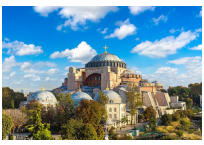
HAGIA IRENE
Original church was destroyed but was rebuilt and now used as a music and place for music eventsAlso converted into a mosque by the Ottoman Empire
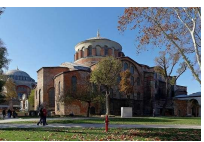
CHURCH OF SAINT CATHERINE
Also converted into a mosque by the Ottoman Empire
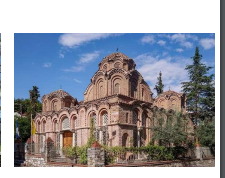
Column of the Hagia Sophia
